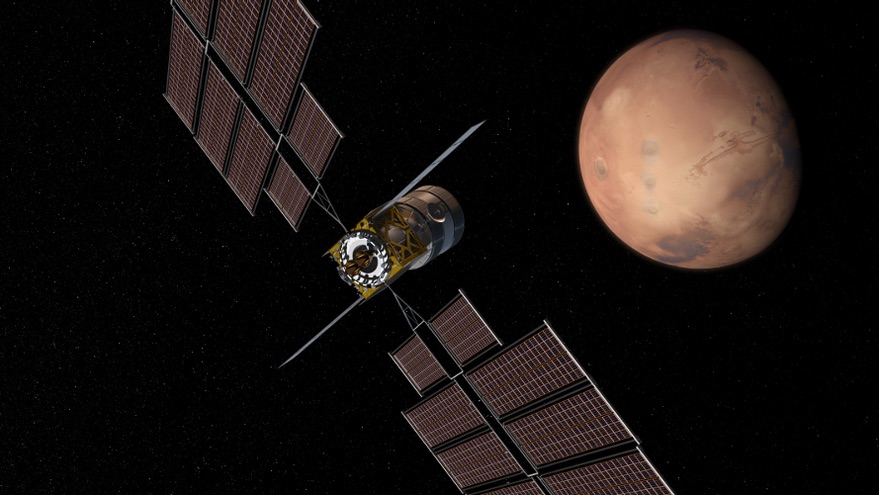Not trying to come out as a condescending A-hole which I am sure is going to infuriate alot of users but I know a faster way we can get all get to Mars but wont do it out of national pride. That is just using the Chinese and the U.S. to start dumping the funding they had from their space agencies to Roscosmos and problem solved. Dont like it, than go figure out what they are doing in their educational institutes or scientists. Back in a 2018 interview of the head chief or Energomesh stated the re-usability of methane and that their are even space companies wanting to use this concept to travel to Mars. Than when asked what is recommended for deep space travel he states it is not LNG fuel but nuclear reactors with ion thrusters. Searched up LNG fuel as what kind of fuel must he be talking about and mostly got results saying methane. Its one of those I cant tell if we or anyone trying to use methane for Mars should feel insulted or not by his interview. And I surely cant argue them that it is idiotic to use nuclear fuel and ion thrusters when NASA themselves have made a Mars 2033 proposal.
A report concluded that NASA has no chance of sending humans to Mars by 2033, with the earliest such a mission could be flown being the late 2030s.

spacenews.com
That Mars mission is part of an overall human spaceflight program with total costs through 2037 of $217.4 billion. That includes the Mars mission costs as well as operations in low Earth orbit and development of Mars surface systems needed for future missions.
На выставке-форуме «Армия-2020», посвящённом новейшим разработкам, был представлен проект российского планетолёта «Нуклон». Беспилотный аппарат уникален не только для нашей страны, но и для всего мира. Предполагается, что...

sdelanounas.ru
In July 2020, employees of the Keldysh Center proposed to launch a Martian complex. The expedition is planned to be carried out in 2030-2033 Its essence is to deliver a person to the surface of Mars during the period of the closest convergence of the two planets.
This complex will consist of 4 nuclear engines, tanks with liquid hydrogen, a warehouse, a ship for returning to earth "Eagle", take-off and landing and residential complexes. To launch it, it will take about 9 launches of heavy and super-heavy missiles. The complex will use a nuclear power plant (NPS), which has a capacity of 200 kW, a mass of 14 tons and emitters of 400 square meters. The estimated cost of such an installation is 8 billion rubles. According to experts, the implementation of the entire project will need at least 450 billion rubles.
In other words 6,324,750,000.00 dollars or more than 100 times the costs they proposed for nuklon to travel to the earths moon, venus and what looks like 3 moons of Jupiter.
https://news.rambler.ru/scitech/446...mars-cherez-10-let-pri-neobhodimosti-rogozin/ 8-10 years is Rogozins estimate if the right amount of funding is acquired.
The previous costs given of the Yenisei were 4 times cheaper than SLS but they had to postpone the design because for them it was still too expensive and they said lets make it methane instead. Its not rather that they are technologically incapable but do not have the money. I hear more news about China trying to make a starship design, havent gotten much headline news of the chinese or the U.S. proposing projects similiar to nuklon, Yes the U.S. is going nuclear now with some proposals but I think its more thermal propulsion than ion propulsion. The funny part is if either China or the U.S. knows ahead of time that they will be losing I know who they will turn to.
I dont know how users on the Space X thread manage to keep themselves entertained with starship flight dates, heat tiles, re-usability usage of engine increases and existing falcon kerosene rockets, tesla stock prices and his friend Bezos. I would more than likely be bored to death most of the time but periodicially check if there is anything new in rocket technology but its the same old same old designs. I get more entertained watching Russia defense net space program threads with news ranging from detonation engines, aerospike engines, new upperstage closed circuit engines that burn kerosene from 300 to 3000 seconds, intruducing parachute landing for orel and upper stage rockets, re-usability usages increases of engines, new rocket engines in the rd-170 to rd-180 series, new re-usable methane rocket Amur expectancy, minauture methane re-usable fly wing rockets like Irkut and probably krylo-sv, of course nuklon, keldysh center showcasing their nuclear reactor powered based for mars of using nuclear reactor travel, quantum engine even with thrusts being higher than what NASA or China being showcased, I expect more from Leonov as a possibility, sending a flying drone to deal with Venus, new material that absorbs radiation better than lead but weighs less as well, etc. Depending how serious the Mars race is between the U.S. and China they have help lurking around the corner which they themselves might be credited for in helping out.





